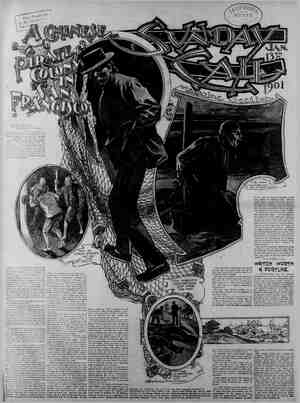Omaha Daily Bee Newspaper, January 13, 1901, Page 17
You have reached the hourly page view limit. Unlock higher limit to our entire archive!
Subscribers enjoy higher page view limit, downloads, and exclusive features.
CAIN & RICHARDSON, YOUNGEST MEMBER OF THE HOUYUSE . Told Out of Court The jydge of the United States court in Porto Rico, relgleu the Chicago Record, bears the musical name of Sulzbacher and comes from New Mexico, where he learned Spanish and became the friend of Senator Elkins, which accounts for his appointment That Judge Sulzbacher is a diplomatist and a man of ready resources a little incldent in his judicial career will prove. Before the policy of congress and the administration toward our new possessions was developed Judge Sulzbacher prematurely decided that the coustitution followed the flag. This Judicial precedent might have troubled other people, but it gave him no concern whatever, because the first time any one questioned his decisiom he replied: “It is true that I held that the constitu- BALDRIGE 97 DOV, —— tion followel the lag, but I did not say with what speed it does the following." Py et A correspondent of Case ' and Comment writes that in a certain family history it is related that ““when Morgan county, Illinois, was first organized a certain farmer was selected for a justice of the peace. When the county was added to a 'circult and a su preme justice came down to hold a court this justice of the peace, with the coumty at torney and others, called on him. The jus- tice of the said: ‘Judge, I want to ask you a question of law.' ‘Ask your county attorney and these other lawyers of your county,’ sald the judge, ‘Oh, I know as much law as those fellows. I want to ask you.' Well, what is it,” sald the judge. ‘Can a justice of the peace grant a' divorce? ‘Cer- tainly not, he has no jurisdiction,’ sald his honor. ‘Well, judge, you're wrong,' sald the justice of the peace. ‘He can, for 1 peace —r TROMPEN S LANCASTER &~ ARENDS &~ O70( — THE LONG AND THE SHORT OF THE SENATE. granted one myself yesterday. and the gal's gone back to Missoull, and the man's work- ing down there in that fleld.' " s People in this country, says the London Chronicle, frequently express surprise at the high salaries paid to members of the judicial bench fin India. When, however these gentlemen have perforce to hear with a4 grave face such pleadings as the follow ing it is not difficult to understand why the government offers them a handsome rate of remuneration, The case in question was one of assault and battery: ‘“My learned friend with more wind from a teapot thinks to browbeat me from my legs. But this Is mere guerrilla warfare. I stand under the hoes of my client and I only seek to place the bone of contention clearly in your honor's eye. Your honor will be pleased enough to observe that my client is a poor widow with one post-mortem son. A widow HOUSE PAGES. of this country, your honor will be pleased enough to observe, is not like a widow of your honor's country—is not able to eat more than one meal a day or to wear dhoties or to look after a man. 8o my poor client had not such physique or mind 83 to ascault the lusty complainant. Yet she has been deprived of some of her valyable leather—the leather of her nose. ““My learned friend has thrown only an argument ad hominum upon my teeth, that my client’s witnesses are all near relatives, But they are not her near relatives. Thelr relationship is there homeopathic. 8o the misty argument: of my learned friend will not hold water. And I am sorry to say that this witness Is a man of my own feathers, that there are In my profession black sheep of every description, and some of them do not always speak gaspel truth. Until the witness therefore explains how he has come across my client's nose leather, he cannot RAE= be belicved, He cannot be allowed to ralse a castle in the air by beating upon a bush." We are glad to observe that the defendant who took a piece of the widow's valuable nose leather was bound over to keep the “plece."” R S, John Philpot Curran, one of the wittiest lawyers who ever faced a court, was once arguing a case before Lord Clare, the Irish lord chancellor. Clare cherished a cordial ¢islike for Curran and in order to show his contempt for that gentleman affected to pay no attention to the argument and devoted himself to fondling a mastiff which he had brought with him to court. Presently he stooped down ostentatiously to pat the dog Instamtly Curran stopped speaking. The lord chancellor looked up and sald: *'Go on, Mr. Curran.” *“I beg your lordship's par- don,"” replied Curran; ““I thought you were engaged in consultaticn,”

